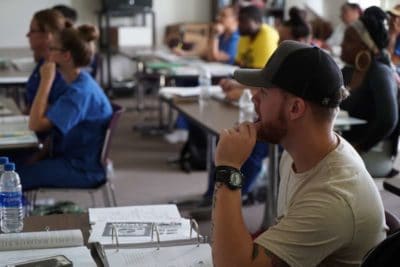Sanford “Sandy” Shugart, president of Valencia College in Orlando, Florida, keynoted this year’s Dallas Herring lecture about urgent and emerging issues in community college education in North Carolina. His topic? Transfers from community college to four-year institutions.
The lecture covered structural racism in higher education and the economy, the importance of community colleges to economic health, and the growing importance of a bachelor’s degree for economic success balanced against the inflating cost of getting that education.
Shugart presented a vision of social and racial equity to be achieved through improved transfer processes. Rebuilding the middle class may be the most important challenge facing higher education, and the only way to do that is to improve transfer processes, Shugart said. Community colleges serve communities of color, low-wealth communities, and first-generation college students at much higher rates than four-year institutions.
“If you care about diversity and equity in this country’s future, transfer has to work,” Shugart said. “Has to work. And it’s been proven that it can.”
Each year, the Dallas Herring lecture is followed by a response. Lisa Chapman, Central Carolina Community College’s president, gave the response this year. She took up Shugart’s charge that more can and should be done to improve the transfer process and turned a North Carolina lens on the issue.
Chapman’s main points were that the statewide transfer agreement, called the Comprehensive Articulation Agreement, is working and that it can be further improved. She also stressed that more and more students are transferring with a workforce degree, the Associate in Applied Science degree, which was never meant as a transfer credential. Those students who are pursuing further education experience greater inefficiency in transferring credits in seeking a bachelor’s degree.
North Carolina’s myFutureNC project backdropped Shugart’s and Chapman’s lectures. The state aims to have 2 million North Carolinians with a “high-quality post-secondary degree or credential” by 2030. For many people, that degree or credential will be earned at a community college and will not require transfer. Even so, North Carolina will not be able to meet its goal unless more students transfer from community colleges to senior institutions to earn their bachelor’s degrees.
The @NCStateBelk Center is about to commence its Dallas Herring lecture! Use #DHL2019 #NCTransfer #StudentSuccess to follow, or stay here with me. Thus begins a long thread live tweeting the discussion of community college success. For a preview: https://t.co/EXVrGKLItH
— Jordan WIlkie (@jojot_wilkie) December 3, 2019



